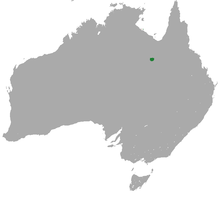Alexandria false antechinus
| Alexandria false antechinus | |
|---|---|
| Scientific classification | |
| Kingdom: | Animalia |
| Phylum: | Chordata |
| Class: | Mammalia |
| Infraclass: | Marsupialia |
| Order: | Dasyuromorphia |
| Family: | Dasyuridae |
| Genus: | Pseudantechinus |
| Species: | P. mimulus |
| Binomial name | |
|
Pseudantechinus mimulus (Thomas 1906) |
|
 |
|
| Alexandria false antechinus range | |
The Alexandria false antechinus (Pseudantechinus mimulus), also known as the Carpentarian false antechinus or Carpentarian pseudantechinus, is a small carnivorous marsupial, found only in a number of small, isolated localities in northern Australia. It is the smallest and rarest of the false antechinuses.
Scientific name: Pseudantechinus mimulus Common name: Alexandria false antechinus, Carpentaria pseudantechinus
The Alexandria false antechinus has had a long history of confusion with the fat-tailed false antechinus (P. macdonnellensis) ever since it was first described by Oldfield Thomas in 1906. W.D.L. Ride suppressed the species in 1971, placing it with the fat-tailed false antechinus, but it was restored by D.J. Kitchener in 1991. Its scientific name means "little mimic of false-antechinus".
The P. mimulus is classified as an endangered species. Its endangerment is due to the decline in habitat quality and extent as a result of fire, introduced predators, and mining.
The Alexandria false antechinus is a member of the dasyurid family. It is closely related to the other species of false antechinus.
The Alexandria false antechinus is coloured buff brown above and greyish white below. Its main distinguishing feature from other false antechinuses is its small size. The behaviour of this species has not been described.
This species is found only in five localities: near Mount Isa in northwestern Queensland; Alexandria Station on the Barkly Tableland in the Northern Territory; and three small islands in the Sir Edward Pellew Group, in the north-east of the territory. In 2009 it was recorded from Pungalina-Seven Emu Sanctuary in the Northern Territory. It inhabits stony hillsides with woodland and spinifex grass.
...
Wikipedia

